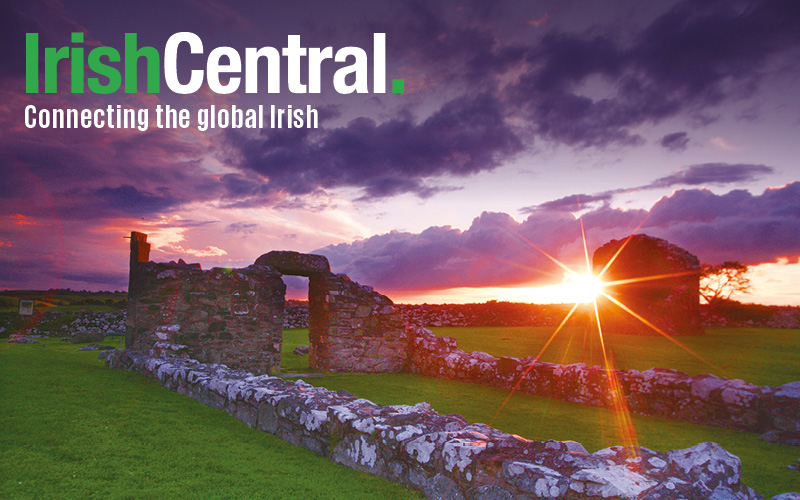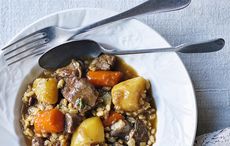Jimmy Van Bramer has been Deputy Leader of New York City Council since 2009, one of the most high profile jobs in the city, where he was overwhelmingly reelected for another four year term in 2014
A prominent member of both the Irish and LGBT caucus, he's a resident of the heavily Irish neighborhood of Sunnyside, Queens.
Van Bramer, 48, is a rising star within the Democratic party and an early frontrunner for Borough Council President for Queens in 2020 and his upbringing was about as classic Irish American as it gets, with one interesting wrinkle, he's gay.
“I was baptized at St. Theresa's, I made my sacraments at St. Jospeh's in Astoria, and then I went on to St. John's University," he tells the IrishCentral. “My dad was very Irish American identified and so we were a very Catholic family growing up."
His career trajectory is classic Irish American. One of eight children (two boys and six girls, he's number five) his background is also that of a very typical working class New York Irish family.
“My father was in a union, he was a pressman for The New York Times, meaning he printed the paper and my mom worked in the local supermarkets like Key Food on 30th Avenue and the Path Mark on Northern Boulevard when she wasn't taking care of us. We didn't have money, we struggled to pay the rent and the bills, but they always worked really hard and people say I work hard as an elected official but it was really because I saw them.”
It might have been a fairly idyllic childhood if he hadn't been nursing a big secret. “I haven't really talked about this ever, but as a boy I loved church,” he confesses.
But something was bothering him. “When I was 10 or so I started to feel different, to believe that I was different. At first I didn't know what that was, but I knew that I was developing crushes on other boys and that was terrifying.”
Later, making his confirmation and realizing at the same time that he liked boys was a square he couldn't circle so he left it up to God. “If there is a God and He listens then obviously He will make me not gay,” he used to pray. Then he smiles: “Obviously the power of prayer has limitations.”
Despite the self-deprecating humor it was a profoundly difficult time in Van Bramer's life. “I was going into high school and whilst I had done extremely well in junior high and elementary school it was suddenly a really dark period for me. I don't know exactly when it started, or how, but I didn't want to go to school.”
Occasionally people would call him gay boy or fa—ot, as they did to so many other kids. He wasn't consistently targeted, but he was terrified to be called names at all.
“I wanted to blend into the woodwork or disappear, but I couldn't make that happen because I don't have superpowers. We lived in an apartment building in Astoria. We had access to the roof and we were the supers. There was a latch on the roof door and you could go up there and see the skyline.”
One morning he left his apartment and looked at the staircase going down and going up. He went up. Instead of going to school he got the idea he would go up to the roof and just stay there all day. It was better than high school he figured.
Recall that this was in the 1980's in New York City, not the Deep South. Even in one of the most accepting communities on the planet he was isolated and in crisis. He didn't skip every day but he started to miss a lot of school over a couple of months.
“My mother finally got a card in the mail with my attendance and I was busted,” he says. His grades, understandably, plummeted. What he did next was find a way to survive as a closeted teen who couldn't tell his parents or siblings what's was bothering him.
“I looked around and realized that (in the Irish American Catholic world I was in) I couldn't be gay. It was the time when AIDS was just hitting. I remember in high school the teachers didn't want to teach a lesson about it. There was a lot of resistance because it was seen as a gay thing and obviously we weren't gay or ever would be.”
On TV one night he watched a debate where an elderly conservative commentator assured his audience that most young gay men who were sexually active would die before they reached 30. “I was terrified,” Van Bramer recalls. “I was being told that gay equals Aids equals death. I decided I couldn't be that. I would just live a straight life. I would get a girlfriend.”
That's exactly what he did. In eleventh grade he got a girlfriend and they dated. “I could pass, I discovered. We dated for a couple of years. Life weirdly got a little bit better. I don't mean this in an unfair way but I think my family and maybe even some friends had suspected I was gay but were a little relieved that I had a girlfriend, if that makes any sense. I started to enjoy school again.”
He hadn't fixed his problem, he took the cards off the table. For the first time in a long time he had breathing room. Luckily, into the picture at this critical time came a life changing teacher named Carol Gomez. There was a mock trial team in the school and she was the coach, she told him to try out for it. He went along and he loved it. He started to enjoy school again.
The first gay person Van Bramer had ever seen was a family friend. “Donny was a family friend in the 1970's when we were kids and he was a teenager. He used to babysit us and sing Rhinestone Cowboy. He would act out the song. We loved him. But I also heard the way that people would talk about him on the block, behind his back. So even though I didn't know what it was I knew being gay was bad and that you shouldn't want to be like that.”
But at the LGBT center in the city they showed the film, The Life and Times of Harvey Milk one day. It was a life changing moment for Van Bramer. “I remember seeing an openly gay guy run for political office and win, I saw the mass mobilization of the LGBT community in San Francisco, and I was 19 and it was such a contrast to all the negative images I had seen for my entire life. These were strong, fierce people who were overturning cop cars and screaming we're not taking this s—t anymore.”
He walked out of the building, looked around Queens Boulevard and told himself, for the first time in his life, that he was going to be OK. Not only that, he decided if he was going to live openly, he was going to fight, he was going to be an activist. He was galvanized.
Back in Astoria this meant coming out to his Irish American family. “I told my mother first. She replied I love you and you're my son. Then she asked me did I have a boyfriend – I didn't – so she said how can be sure? I told her she would just have to trust me!”
Van Bramer's father had never talked about these kind of things. “When I told him it wasn't the warm embrace that my mother provided. It wasn't the same level of validation. It was news that he had anticipated getting but at the time it wasn't the most welcome news. We are very close now, it wasn't a rejection, he loves my husband now too."
There are a striking of prominent LGBT Irish Americans elected officials who are now rising stars within the city council in New York, a thing that would have been unheard of even two decades ago. It's inevitable that all the suppressed potential that was always there has finally been unleashed he says.
“My being gay has everything to do with what I've done and who I've become. I always knew I was different. Somehow that produces a level of fearlessness in trying to get as much out of the experience as I can. There's also a making up for lost time. My ability to fight and overcome is all wrapped up in this personal experience that has helped propel me. It's led me to this career in a very profound way.”
Van Bramer made national headlines when he led a protest march across the Queensboro Bridge to Trump Tower to protest the candidates platform, particularly his hostile attitude toward immigrants.
“I feel incredibly strongly about the journey my Irish grandparents and great grandparents took. I know that they struggled really hard to leave their hometown to find a better life here. I have heard the stories of how poor they were when they got here and how poorly treated they were. They had nothing. Because they fought and endured, their grandson is City Council Member representing Sunnyside and Woodside.”
It's immigrants that make America great, he argues. That was the message he sent with his Queens Values march to Trump tower on Fifth Avenue.
Already frontrunner candidate for Queens Borough President, he explains why he has decided he will run. “I have enjoyed being an elected official, it's been the greatest experience of my life. I love helping people and fighting for people and being a champion for causes.
“The idea that I could do that for the entire borough of Queens would be a dream come true. Coming from where I come from. I want to continue to serve and makes Queens all it can be. I represent 170, 000 people the vast majority are not LGBT but they know my husband and I as neighbors, as a council member, as a friend. They see me fighting for their kids and institutions and building schools and I think that closes the gap. We see we have so much in common. Doing that for the entire borough would be fantastic.”




Comments